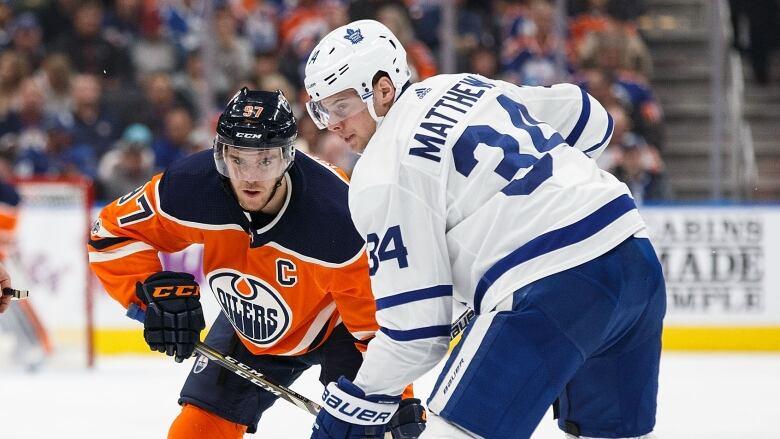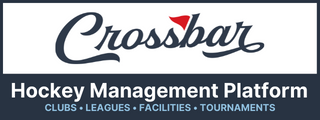
Hockey's Back: NHL Postseason Starts Aug. 1!
By Scott Lowe - MyHockeyRankings.com
CBC.com Photo
Unlike Major League Baseball, the National Hockey League and its players’ association were able to come to terms on a four-year collective bargaining agreement extension Monday. The agreement reportedly allows for NHL-player participation in the next two Olympics and a bunch of legal mumbo jumbo covering salary caps, escrow and other issues most people who watch hockey don’t really care about.
Most important, though, coming to terms allows NHL teams to move into Phase 3 and 4 of the league’s return-to-play plan. What does that mean?
Hockey is back!
The NHL and the players agreed that the league’s postseason tournament will begin on Aug. 1, with 24 teams competing for the Stanley Cup. Eastern Conference teams will play exclusively in Toronto, with Western Conference clubs competing in Edmonton. The tournament, which usually features 16 teams, will culminate with the Stanley Cup finals likely in early October in Edmonton.
NHL players have been trickling back into their home cities and skating informally for the past several weeks. Training camps are set to open on or around July 10. It is thought that the 2020-21 season would then begin sometime in December, with a complete 82-game regular season in the plans.
There still are hurdles to overcome.
Any player can choose to opt out of Phase 3 and 4 for any reason by informing the league in writing over the next three days. As we’ve seen with baseball, this is likely to happen. Players with young families, pregnant wives or other underlying health concerns may choose to sit this one out.
Players are going to test positive for COVID-19 and have to self-isolate for 14 days. This is the reality we now have to live with, and as of yesterday 35 players had tested positive.
But by choosing two Canadian hubs on the heels of Prime Minister Justin Trudeau’s statement that it appears Canada has seen the worst of the coronavirus, it seems as though the NHL likely will be able to see its return-to-play plan through to completion while the Major League Baseball season still appears to be in jeopardy.
The Format
Some hockey purists – and most of the Carolina Hurricanes – believe the NHL should have stuck with its usual 16-team postseason format, while others claim that the league should just scrap the 2019-20 season and that any championship awarded will be tarnished. Regardless, the new and creative 24-team team bracket allows clubs that were still in the hunt when the season shut down in March to fight for a playoff berth while providing fans with an intriguing and exciting format to follow and dissect.
No matter what, we should have playoff hockey to watch in August and September. After everything we’ve been through the past four-plus months, any form of live sports entertainment will be welcomed with open arms by most of us.
For this year’s postseason, the top-four teams in each conference based on points percentage when the season was halted will compete in a three-game round-robin mini-tournament using regular-season overtime rules to determine the order of the top-four seeds in each conference. While that is going on, teams five through 12 in each conference will face off in best-of-five-game series to determine who advances to the final 16-team playoff.
From that point on, the playoffs will proceed with the standard best-of-seven series, and teams will be “re-seeded” after each round. That means that the highest-remaining seed will face the lowest-remaining seed in each stage. Clubs that are eliminated in the Qualifying Round will be classified as having missed the playoffs and eligible to be part of the draft lottery.
Adding eight teams to the postseason mix has allowed franchises from large hockey markets such as Chicago, New York and Montreal – as well as American and Canadian hockey hotbeds Minnesota and Winnipeg – a chance to compete for the Stanley Cup. This, along with a shorter best-of-five Qualifying Round during which anything can happen, adds to the intrigue and excitement surrounding the tournament.
We will look at individual matchups and other storylines as the tournament approaches, but here is a quick rundown of what’s ahead for now:
Qualifying Round Matchups – Eastern Conference in Toronto
#5 Pittsburgh vs. #12 Montreal
#6 Carolina vs. #11 New York Rangers
#7 New York Islanders vs. #10 Florida Panthers
#8 Toronto vs. #9 Columbus
Pittsburgh (.623) vs. Montreal (.500)
The Penguins were surging down the stretch and looked to be one of the teams to beat in the East after playing musical bodies most of the season because of injuries to many key players. Could coach Mike Sullivan’s incredible coaching job go to waste at the hands of a hot Carey Price in a short series? This one will be interesting. The most important decision on Sullivan’s plate will be the starting goaltender, but he’s had to deal with that before when Matt Murray unseated Marc Andre Fleury. Will it be the two-time Cup-champion backstop Murray or the young upstart Tristan Jarry? Jarry recorded a .921 save percentage, good for ninth in the league. The Pens also expect Jake Guentzel, who had 43 points in 39 games before getting injured, back in the lineup.
Carolina (.596) vs. N.Y. Rangers (.564)
The Hurricanes have been one of the most outspoken teams as far as feeling slighted by having to play in the Qualifying Round. While they only had a three-point advantage on teams chasing them for a wildcard spot when play was halted, many analytics showed them to be a prohibitive favorite to earn a playoff berth based on their remaining schedule. Instead, they have to take on a young, up-and-coming Rangers squad with some top high-end talent and nothing to lose. New York is the second-youngest team in the league, but went 4-0 vs. Carolina this year, which is why we’ve been hearing so much grumbling out of North Carolina. New York was 9-1-0 during a three-week span in February to pull within striking distance of the Canes. The good news for Carolina is that injured defensemen Dougie Hamilton, who was having a Norris-caliber year, and Sami Vatanen will be back. New York forward Chris Kreider also returns from a broken foot.
New York Islanders (.588) vs. Florida Panthers (.565)
With a ton of skilled top-six talent and Stanley Cup-winning coach Joel Queeneville coming on board, Florida was expected to contend for a playoff berth this season. Then they were on the outside looking in. Then they were in. Well, not really in, but close to in with a chance to play the Islanders for the right to be in. These teams met three times during the regular season, with the Islanders winning twice, two games decided by a single goal and a total of 12 goals scored. Barry Trotz is a master at locking top talent down and will look to do so again in what should be a great cerebral bench matchup. New York’s margin of error is slim, however, since the Islanders struggle to score goals. Florida lost 12 of its last 18 games heading into the shutdown, while the Islanders dropped nine of 11 and seven straight. The clean slate benefits both teams. In a series where goals will be at premium, the Panthers have three players with between 59 and 78 points and five 20-goal scorers, while the Isles have only one player with more than 54 points and three with more than 20 goals.
Toronto (.579) vs. Columbus (.579)
What can you say about this matchup other than it record-wise it looks even, while on paper many would make the Leafs a prohibitive favorite? That’s just the way John Tortorella likes it. Toronto’s high-flying offensive talent, including Auston Matthews, John Tavares, Mitch Marner and William Nylander, is well-documented, but so is Torts’ ability to protect the house, clog every shooting lane and get his players to buy in to sacrificing all body parts for the good of the team. Just ask Tampa about how much fun the Jackets are to play against in the postseason. Columbus was tied for the final wildcard berth in the East when the season was halted despite losing the most man games to injury (418) in the league and has one of the league’s most promising young goaltending tandems. The Maple Leafs haven’t won a Stanley Cup since 1967, so some have suggested that this crazy year – when the champion no doubt will be questioned by many – is going to be the one in which they finally put it together.
Eastern Conference Top Four Round Robin – Toronto
#1 Boston (.714)
#2 Tampa Bay (.657)
#3 Washington (.652)
#4 Philadelphia (.645)
When all systems were shut down, the Bruins had clearly established themselves as the class of the league, the red-hot Flyers were breathing down the Caps’ neck in the Metro Division and Tampa Bay had recovered from a slow start and a failed 2019 postseason to become a popular pick to win the Stanley Cup. Meanwhile, Washington had settled into cruise-control mode and seemed to be bored and looking ahead to the postseason.
None of that matters now.
These four teams will play each other once using regular-season overtime rules while the Qualifying Round games are being played to determine the order of the top-four seeds in the Eastern Conference. Expect the Caps to turn it up a notch now that the postseason is here in what should be some entertaining matchups. Can the Flyers recapture the magic that had moved them near the top of the Metro? Will Boston and Tampa feel the pressure of possibly losing the seeds they had worked so hard to secure throughout the season?
It will be interesting to see if these teams approach the round robin as if each game is a Game 7 or by getting everyone plenty of ice time in preparation for the playoff grind. Ties will be broken by regular-season points percentage.
Qualifying Round Matchups – Western Conference in Edmonton
#5 Edmonton vs. #12 Chicago
#6 Nashville vs. #11 Arizona
#7 Vancouver vs. #10 Minnesota
#8 Calgary vs. #9 Winnipeg
Edmonton (.585) vs. Chicago (.514)
The Oilers should have the advantage of a Cup-hungry, crazed hometown crowd … Oh, wait. The Blackhawks are an interesting mixture of aging playoff-grizzled veterans like Jonathan Toews, Patrick Kane, Brent Seabrook, who now is expected to play, and Duncan Keith along with talented young players such as Alex DeBrincat, Dominik Kublik, Alex Nylander and Kirby Dach. Still, this is a matchup of one of the league’s top offensive teams – led by Connor McDavid and Leon Draisaitl – against a Chicago team that allowed more than three goals a game and the most shots on goal in the league. Edmonton averaged better than 3.5 goals per contest during the season’s final 2-1/2 months. Chicago is balanced, not only in terms of veterans and youth, but also on the scoresheet as seven Blackhawks scored 10 or more goals and six recorded 30 or more points. To have a shot, though, Blackhawks veteran netminder Corey Crawford will have to stand on his head.
Nashville (.565) vs. Arizona (.529)
Nashville, like its Winter Classic-opponent Dallas, is one of those teams that struggled early, made a coaching change and slowly but surely worked its way back into the playoff mix. Arizona was a team that many expected to contend for a playoff spot going into the season, but was chasing the pack when the campaign was shut down. Pekka Rinne could be the key for the Predators, who have solid offensive depth at the top of the lineup in Matt Duchene, Ryan Johansen, Filip Forsberg and Viktor Arvidsson. Rinne has been very inconsistent since his 2018 Vezina season, but maybe the break and clean state will help him return to form. The Coyotes added Taylor Hall in December to provide some help for offseason pickup Phil Kessel, who saw his point total drop from 82 to 38 this season. Coyotes netminder Darcy Kuemper is healthy now after a December injury and brings a stellar 2.22 goals-against average and .929 save percentage into the tournament. Unless Rinne returns to form, Kuemper and a stingy Arizona defense led by Oliver Ekman-Larsson, Jakob Chychrun, Niklas Hjalmarsson and Jason Demers may give the Coyotes the edge.
Vancouver (.565) vs. Minnesota (.558)
A hot team that changed coaches and jumped into the playoff hunt by winning seven of 10 games before the shutdown, the Wild do not seem to match up on paper and will not be able to draw from any of they momentum they had generated. The Canucks have four 20-goal scorers in Elias Petterson, J.T. Miller, Bo Horvat and Tanner Pearson; a Calder Trophy candidate on defense in Quinn Hughes and Jacob Markstrom in net. Minnesota’s Kevin Fiala had a strong year with 54 points, but core veterans Ryan Suter, Eric Staal and Zach Parise are on the downside of their careers. Goalie Alex Stalock had a strong season (2.67 GAA, .910 save percentage), but will have to improve upon those numbers to give his team a chance against a young, talented offensive group.
Calgary (.564) vs. Winnipeg (.563)
It’s too bad these two teams aren’t facing each other in front of their rabid fan bases as the atmosphere in both rinks would be phenomenal. Fortunately, we have social media and all the back-and-forth chirping that goes along with that to keep us entertained. These are a pair of offensively talented clubs that many have expected to be better, but the one thing that stands out is the Jets’ advantage in goal with Vezina-candidate Connor Hellebuyck. Hellebuyck played 58 games, tied for most in the league, and was second in save percentage (.922) among league goalies with at least 40 appearances behind a defense that lost three of its top players in the offseason. With four forwards the caliber of Mark Schifele, Patrik Laine, Blake Wheeler and Kyle Connor, Winnipeg stacks up nicely up front against the Flame’s Johnny Gaudreau, Matthew Tkachuk, Elias Lindholm and Sean Monahan. Norris-winner Mark Giordano certainly helps Calgary’s cause on the back end, but will David Rittich or Cam Talbot step up in goal to keep the Flames close enough to win three games?
Western Conference Top Four Round Robin – Edmonton
#1 St. Louis (.662)
#2 Colorado (.657)
#3 Vegas (.606)
#4 Dallas (.594)
Last year the Blues canned their coach with the team at the bottom of the standings in January and rallied behind Craig Berube for a memorable run to their first Stanley Cup. Both Vegas and Dallas are hoping that formula turns out to be a winning one for them this season, but St. Louis still enters the postseason as the favorite out of the West. Colorado, which has weathered injuries while managing to stay near the top of the standings, presents a stern challenge as one of the most talented offensive teams in the NHL.
Vegas and Dallas both caught fire after coaching changes and were among the league’s hottest teams when play was halted. Again, depending on how these teams approach the round-robin portion of the tournament, these early matchups could be some of the fastest and most exciting of the entire postseason.
St. Louis and Dallas have two of the league’s deepest defensive groups, Colorado can skate and dangle with anyone up front and Vegas has depth on the front and back ends along with Stanley Cup-tested netminder Marc Andre Fleury in goal. Oh, and if Fleury stumbles, the Golden Knights can just plug in former last year’s Vezina finalist and trade-deadline addition Robin Lehner to replace him.
No matter how you feel about the NHL returning to action, this postseason tournament should be a lot of fun to watch.

